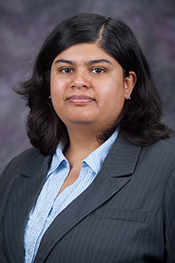Pavithra Prabhakar | Professor
 Peggy and Gary Edwards Chair in Engineering
Peggy and Gary Edwards Chair in Engineering
Ph.D. - 2011, University of Illinois at Urbana-Champaign
Computer Science
M.S. - 2010, University of Illinois at Urbana-Champaign
Applied Mathematics
M.S. - 2006, Indian Institute of Science
Computer Science and Automation
B.Tech. - 2004, National Institute of Technology, Warangal
Computer Science and Engineering
Contact information
2176 Engineering Hall
785-532-7941
pprabhakar@k-state.edu
Personal Website
Professional experience
Dr. Pavithra Prabhakar is professor in the department of computer science, and holds the Peggy and Gary Edwards Chair in Engineering. She is currently serving the National Science Foundation as a Program Director in the Software and Hardware Foundations Cluster in the Computer and Information Science and Engineering Directorate. She obtained her doctorate in computer science and a master's degree in applied mathematics from the University of Illinois at Urbana-Champaign, followed by a CMI postdoctoral fellowship for a year at the California Institute of Technology. Prior to coming to K-State, she spent four years at the IMDEA Software Institute in Spain as a tenure-track assistant professor. She previously interned at Bell Labs, Murray Hill, while working toward her doctorate.
Research
Prabhakar’s main research interest is in formal analysis of intelligent, autonomous, and cyber-physical systems with emphasis on both foundational and practical aspects related to automated and scalable techniques for verification and synthesis of hybrid control systems. Her research borrows ideas from automata theory, control and dynamical systems theory, formal methods and logics. She has lead several project on safety analysis of cyber-physical systems, including novel methods that combine counter-example guided abstraction refinement and hybridization. She has pioneered a novel approach for stability analysis of hybrid control systems based on ideas from formal methods which has appeared in the form of several invited papers and best paper award nominations. She is currently pursuing projects on robust analysis and design of autonomous and cyber-physical systems with artificial intelligence and machine learning components and applications in automotive, aerospace and robotics systems, and agricultural automation.
Academic highlights
Prabhakar has authored more than 70 articles in peer-reviewed conferences and journals that include conferences in the areas of formal methods (CAV, TACAS, VMCAI), AI/ML (Neurips), cyber-physical systems (ACM/IEEE HSCC, EMSOFT, CDC, ACC) and controls journals (IEEE TAC). Her papers have been selected for a best paper honorable mention award from Hybrid Systems: Computation and Control, best papers of MEMOCODE and invited papers at Allerton and American Control Conference. She has served on the program committees of several conferences including EMSOFT, HSCC, CAV, VMCAI, ACC, QEST, FORMATS, FSTTCS. She has been the organizer/chair of two Dagstuhl seminars, Design and Analysis of Robust Systems (DARS) workshop, Numerical Software Verification (NSV) workshop, CyPhy Workshop, and Verification Mentoring Workshop (VMW). Her research has been sponsored by EU, NSF, ONR, and USDA. She has been awarded a Sohaib and Sara Abbasi fellowship from UIUC, an M.N.S Swamy medal from the Indian Institute of Science, a CMI postdoctoral fellowship from Caltech, a Marie Curie Career Integration Grant from the European Union, Michelle Munson-Serban Simu Keystone Research Faculty Scholarship from the College of Engineering, an NSF CAREER Award, an ONR Young Investigator Award, and an Amazon Research Award.